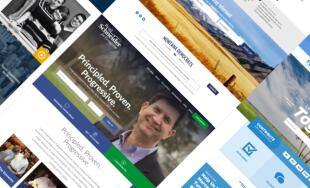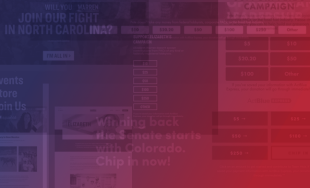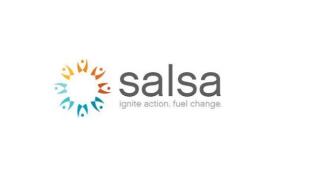Top 10 Most Important Online Political Events of 2008
Our political web design firm watched and participated in the 2008 elections with great interest and vigor. 2008 was possibly the watershed year for online politics where all candidates finally realized that the Internet wasn't just a fad or a gaming platform, but actually serves as perhaps the most powerful and efficient tool to mobilize volunteers and win votes.
There were many success and failures in the 08 cycle, below is the list of the top 10 that we put together. If you have ideas for other events that we left off, be sure to leave them in the comments. Also, we invite you to vote in our poll and weigh in on what you think were the most important online political events of 2008. In the New Year, we'll release the final results of the poll and the most popular events that people felt we left off our list.
Enjoy the list and please join the conversation by leaving a comment or voting in the poll!
10. Mitt Romney's YouTube Ad Contest - Romney crowdsourced an ad that actually ran on TV. The campaign gave supporters an opportunity to make their own ad using Jumpcut's video editing technology. While Moveon.org and Chevrolet had used similar strategies before, Romney was the first of the 08 candidates to use the technique and it was a great success garnerning 129 impressive submissions and producing this final ad.
9. 5 Friends YouTube Video - An independent, funny, non-partisan viral video of celebrities urging people to vote. The video embraced the viral nature of the web and encouraged people to pass along the Google Polling Place Locator to 5 of their unregistered friends. The video and its sequel garnered more than 5 million views, mentions on hundreds of blogs, and were highlighted by many mainstream media outlets.
8. YouTube Debates - At first the Republicans were hesitant of having a debate mediated by questions submitted via YouTube, but in the end, both parties hosted fun, but rather non-controversial, YouTube debates. It was undoubtedly the first time debate questions had been asked in the form of songs and there was added emotion when soldiers in uniform asked about national security plans, which made the debates an interesting and innovative experiment. Also, as the debates were co-sponsored by CNN and YouTube, it was an interesting and prophetic meshing of new and old media.
7. Ron Paul's Online Fundraising - While most of the online fundraising attention was directed at Barack Obama, almost more impressive is what Ron Paul was able to do as a longshot candidate that wasn't even allowed to participate in the debates. No backing from the party and little media coverage didn't stop Paul from setting a GOP one-day record for online fundraising by hauling in $4.2 million in 24 hours on November 5, 2008. It was all due to an independent grass roots campaign tie to the commemoration of Guy Fawkes Day through YouTube videos, blogs, and social networks.
6. Disorganization of McCain's Online Campaign - While Obama's campaign will go down as the prototype for a new media campaign, McCain seemed to be stuck in the stone ages. Obama had dozens of staffers dedicated solely to online operations, while many reports have the McCain campaign dedicating fewer than 5 people to the web campaign. While Obama's campaign was busy mobilizing millions of volunteers through the web, McCain was content to go on the record saying he did not know how to e-mail. The lack of online effort by McCain is almost as significant as Obama's innovation, as it defined McCain as a candidate of the past that didn't understand today's generation.
5. Politico.com, HuffingtonPost.com, Fivethirtyeight.com - In this election, it seemed as Internet news sites had the upperhand on most of their "traditional" counterparts. By being flexible and quick to update, these sites were the go-to sources for the obsessed campaign watchers that wanted the latest breaking news. Their style forced media stalwarts to change their style and be more willing to update news on the fly and have permanent blogs on their homepages.
4. Obama Driving Online Signups Through VP Text Promise - While this event wasn't strictly online, there's no way we could leave it off the list. Obama's VP announcement text was able to signup millions of interested voters, many of those registered online or were pushed to the website to further engage with the campaign. The VP announcement was texted to nearly 3 million mobile devices. Over the coming months, Obama would use the numbers to push people to the campaign website, have them watch the DNC, and thank them for their support.
3. Hulu, YouTube, Blogs, etc on Tina Fey's Palin Impression - Fey's impression of the VP candidate may go down as the most famous impression in history. The videos have garnered more than 20 million views on NBC.com and YouTube, and more importantly, it let Fey define Palin before the Governor could do so on her own terms. Without the web, the impression would not have been nearly as ubiquitous and "mavericky" may have never entered our vernacular, however, through video sharing sites, the video was able to reach an audience exponentially larger than a typical Saturday Night Live broadcast. Not only loved by the public, the impression was also a critical success, leading to Fey being named one of TIME's people of the year and the AP Entertainer of the Year.
2. My.BarackObama.com - While other candidates were happy setting up supporter pages on Facebook and MySpace profiles, Barack Obama took it to the next level by hiring one of the Facebook founders and "re-inventing the wheel" by building his own social network, my.barackobama.com (MyBo). More than 1 million people registered with MyBo, but the power of MyBo wasn't just registrants but the tools that the site put at their disposal. Unlike the other campaigns, Obama used his social network to mobilize volunteers and give them the tools to fundraise and engage friends. In the end, according to the P2P foundation, more than 1 billion emails were sent from MyBo, over 100,000 events had been scheduled, and hundreds of millions of dollars had been raised.
1. Campaign Websites Finally Come Into Their Own. This was the first election year in which every Presidential candidate put forth a significant effort online. In '04, Dean was the first to really "get it" and use his site as more than just a brochure. This year, every candidate, specifically Clinton, Edwards, Obama, and Romney embraced the Web by having social networks, active bloggers, flash video, user generated content, and more. The revolution wasn't just limited to these top level campaigns, as many Congressional level and even state races embraced the web as the engaging, efficient, and effective medium that it has become.
That's our top 10 list. Let us know in the comments what we left out and be sure to vote in our poll for the most important online political events of 2008. Some close runners up were Sarah Silverman's Great Schlep, the Google Polling Place Locator, and the GOP crowdsourcing their platform.
We're excited to see the new online political innovations in 2009; what this year did most successfully was convey the importance of online efforts to campaigns at every level.
For more insights on the everchanging landscape of online politics, sign up for our online campaigning newsletter.



Leave the first comment